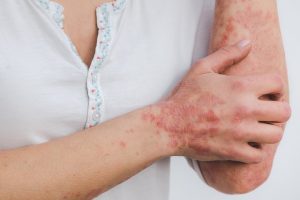Psoriasis is a chronic autoimmune disease that affects the skin, causing red, scaly patches that can be itchy and painful. It is estimated that over 125 million people worldwide suffer from psoriasis, making it a significant health concern. Finding effective treatments for psoriasis is crucial to improving the quality of life for those who suffer from this condition.
What is Psoriasis?
 Psoriasis is a chronic skin condition that causes red, scaly patches on the skin. It is an autoimmune disease, which means that the body’s immune system attacks healthy cells in the skin, causing inflammation and the formation of plaques. There are several types of psoriasis, including plaque psoriasis, guttate psoriasis, inverse psoriasis, pustular psoriasis, and erythrodermic psoriasis.
Psoriasis is a chronic skin condition that causes red, scaly patches on the skin. It is an autoimmune disease, which means that the body’s immune system attacks healthy cells in the skin, causing inflammation and the formation of plaques. There are several types of psoriasis, including plaque psoriasis, guttate psoriasis, inverse psoriasis, pustular psoriasis, and erythrodermic psoriasis.
Plaque psoriasis is the most common type of psoriasis and is characterized by raised, red patches covered with a silvery-white buildup of dead skin cells. Guttate psoriasis appears as small, red spots on the skin and often occurs after a bacterial infection such as strep throat. Inverse psoriasis affects areas where skin rubs against skin, such as under the arms or in the groin area. Pustular psoriasis causes pus-filled blisters on the skin, while erythrodermic psoriasis causes widespread redness and scaling of the skin.
Psoriasis affects people of all ages and races but is most commonly diagnosed in adults between the ages of 15 and 35. It affects both men and women equally.
Causes of Psoriasis
The exact cause of psoriasis is unknown, but it is believed to be a combination of genetic factors, environmental triggers, and immune system dysfunction. People with a family history of psoriasis are more likely to develop the condition themselves.
Environmental triggers such as stress, infections, injuries to the skin, and certain medications can also trigger psoriasis flare-ups. Immune system dysfunction is believed to play a role in the development of psoriasis, as the immune system attacks healthy skin cells, causing inflammation and the formation of plaques.
Symptoms of Psoriasis
The most common symptoms of psoriasis are red, scaly patches on the skin that can be itchy and painful. The severity of symptoms can vary from person to person, with some people experiencing only mild symptoms while others experience severe symptoms that can affect their quality of life.
Psoriasis can also cause joint pain and stiffness, a condition known as psoriatic arthritis. This can lead to joint damage if left untreated.
The impact of psoriasis on a person’s quality of life can be significant, with many people experiencing feelings of embarrassment, shame, and depression due to the appearance of their skin.
Diagnosing Psoriasis
Psoriasis is typically diagnosed through a physical examination by a dermatologist. The doctor will examine the affected areas of skin and may take a biopsy to confirm the diagnosis.
Blood tests may also be performed to rule out other conditions that can cause similar symptoms.
Treatments for Psoriasis
There are several treatments available for psoriasis, including topical treatments, phototherapy, systemic medications, and biologic drugs.
Topical treatments such as corticosteroids and vitamin D analogs are applied directly to the affected areas of skin and can help reduce inflammation and itching. Phototherapy involves exposing the skin to ultraviolet light, which can help slow down the growth of skin cells.
Systemic medications such as methotrexate and cyclosporine are taken orally or by injection and work by suppressing the immune system. Biologic drugs such as adalimumab and etanercept target specific parts of the immune system that are involved in psoriasis.
Home Remedies for Psoriasis
In addition to medical treatments, there are several home remedies that can help manage psoriasis symptoms. Moisturizers can help soothe dry, itchy skin, while oatmeal baths can help reduce inflammation and itching.
Aloe vera and turmeric are also believed to have anti-inflammatory properties and may help reduce psoriasis symptoms.
Prevention of Psoriasis
While there is no known way to prevent psoriasis, there are several lifestyle changes that can help manage symptoms and reduce the frequency of flare-ups. Avoiding triggers such as stress, infections, and injuries to the skin can help prevent flare-ups.
Managing stress through techniques such as meditation and yoga can also be helpful in managing psoriasis symptoms.
Psoriasis is a chronic autoimmune disease that affects millions of people worldwide. While there is no cure for psoriasis, there are several treatments available that can help manage symptoms and improve quality of life.
It is important for those who suffer from psoriasis to seek treatment and work with their healthcare provider to find an effective treatment plan. With proper management, it is possible to live a full and active life with psoriasis.









